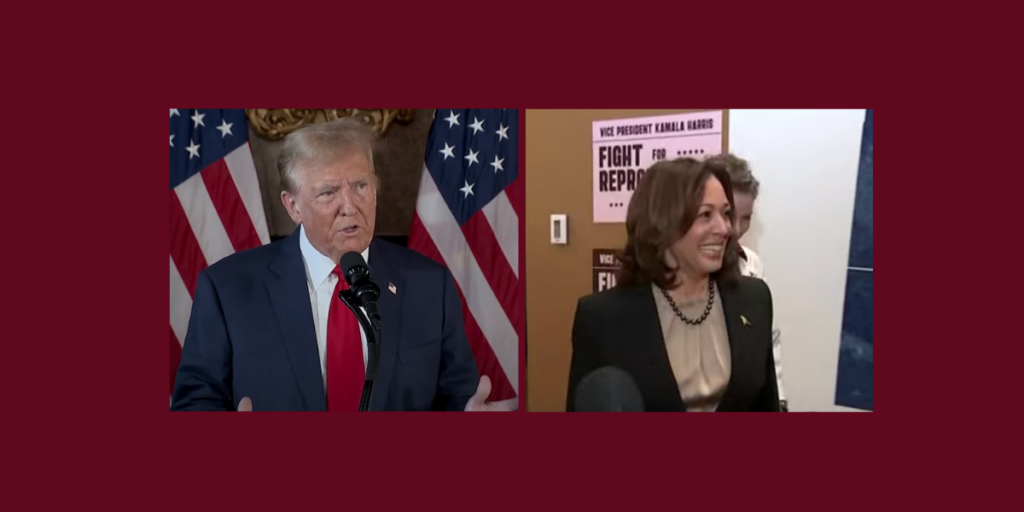
Two views of abortion
By: Lisa Lerer, originally published September 30, 2024, The New York Times
The question of whether women should be allowed to end a pregnancy has roiled American politics for more than half a century. But this year’s presidential race is the first since the Supreme Court overturned Roe v. Wade, and abortion politics and policy are changing rapidly.
Kamala Harris has made abortion rights a central promise of her candidacy. But she would likely face legislative hurdles to restore them nationwide.
Donald Trump takes a murkier approach. He argues that abortion law should be left to the states. But some of his allies want to criminalize the procedure across the country, and he refuses to say whether he would oppose a national ban if Congress passed one.
The Morning is running a series explaining the policy stakes of the election and the impact a Harris or Trump victory could have on key issues in American life. In this installment, I’ll focus on abortion. I’ve covered abortion politics for more than a decade and am co-author of a recent book, “The Fall of Roe: The Rise of a New America.”
Trump’s murky view
Trump has a long history of reversing course on abortion.
In 1999, as he flirted with a presidential run, he declared himself “very pro-choice.” A dozen years later, he publicly changed his position. “Just very briefly, I’m pro-life,” he told attendees at the Conservative Political Action Conference in 2011. During his 2016 campaign, he built a close alliance with social conservatives by promising to nominate “pro-life justices” to the Supreme Court.
But as the politics shifted after the fall of Roe, Trump struggled to find his footing. In March, he expressed openness to a 15-week national ban. Anti-abortion activists want such legislation because it would curtail abortion in liberal states where the procedure is legal later in pregnancy. (This tracker by my colleagues shows where abortion is on the ballot in November.)
A few weeks later, Trump reversed his stance and said that abortion law should be left to the states — and that any bans should include exceptions for rape, incest and the life of the mother. At a rally this week, he expressed a desire for female voters to move beyond the issue, promising that if he was elected they would “no longer be thinking about abortion.”
In fact, there are reasons to believe that Trump could go beyond even a national ban. Some of his allies have suggested using laws like the Comstock Act, a measure from 1873, to prosecute people who ship any materials used in an abortion — including abortion pills, which now account for most U.S. abortions.
Others have suggested revoking F.D.A. approval for abortion medication and using the Health and Human Services Department to track personal details about women receiving abortions. They’ve also said the government shouldn’t enforce a law requiring hospitals to provide emergency care to pregnant women who need an abortion. A few want to stop mandating that insurance cover certain emergency contraceptives.
Harris’s vocal support
Harris’s position has been clearer. She views restricting access to the procedure as not only bad policy but, as she said in the presidential debate this month, “immoral.”
Harris has championed the issue like no previous presidential candidate, using direct terms like “uterus” and holding an event at an abortion clinic. She promises to sign a bill re-establishing Roe’s protection of abortion in roughly the first 23 weeks of pregnancy. She also favors access to fertility treatments, which some anti-abortion activists want to limit.
For all her promises, her efforts would likely be hampered by legislative realities. Thanks to Senate filibuster rules, 60 votes are required to pass most legislation. Even if Democrats maintain their slim majority in the chamber, they’re unlikely to clear that hurdle. A simple majority can vote to end the filibuster, and a central question for a Harris presidency would be whether Senate Democrats would do so.
There is also uncertainty about what a bill would include. Many abortion rights activists think abortion should be legal beyond 23 weeks. Harris has declined to answer questions about whether she favors abortion rights in the final three months of pregnancy.
But on one point there is no confusion: A Harris administration would try to open up more avenues for abortion, and a Trump administration would restrict them.
Lisa Lerer is a national political correspondent to The New York Times.
